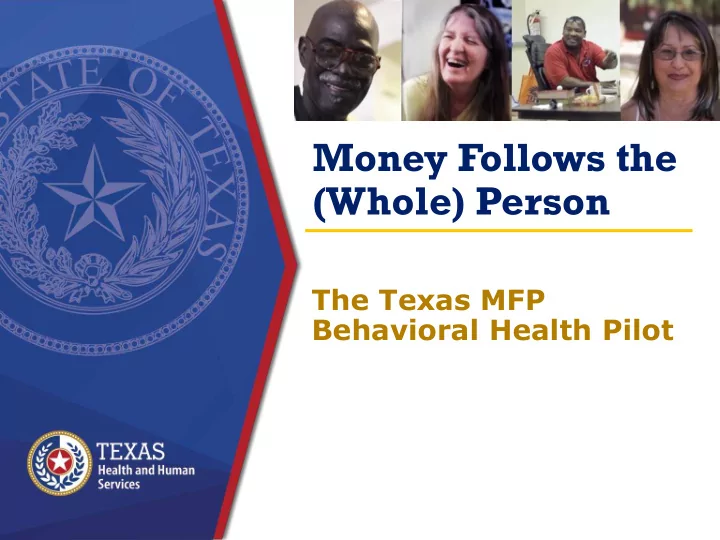

Money Follows the (Whole) Person The Texas MFP Behavioral Health Pilot
The Big Picture • Texans with severe mental illness live 29 years less than other Americans and have health problems earlier in life. 1 • Nationally, the number of NF residents under age 65 with a primary diagnosis of MI is nearly three times that of older residents 2 1. Lutterman T, Ganju V, Schacht L, Shaw R, Monihan K, et.al. Sixteen State Study on Mental Health Performance Measures. DHHS Publication No. (SMA) 03-3835. Rockville, MD: Center for Mental Health Services, Substance Abuse & Mental Health Services Administration, 2003 2. Bagchi, A.D., Simon, S.E. & Verdier, J.M. (2009). How many nursing home residents live with a mental illness? Psychiatric Services, 60(7), 958-964. Stoner 2
Money Follows the Person • A Medicaid demonstration that enables individuals leaving institutions, such as nursing facilities, to access Medicaid funding for services and supports • Texas pioneered the idea of MFP with a state-funded initiative, which preceded the federal demonstration • The Demonstration (MFPD) allowed additional flexibility to test new ways to provide services and supports Stoner 3
BHP Goals • Transition adults with mental illness and/or substance use disorders (SUDs) from nursing facilities • Address barriers for this population • Better support individuals in their homes and communities • Create positive changes to the Medicaid managed care system Stoner 4
Barriers • Lack of social and familial support • Lack of transportation • Multiple chronic health conditions (e.g., lung disease, diabetes, heart disease, cirrhosis) • Housing issues (e.g., past forensic involvement, poverty) • Cognitive / functional challenges • Substance abuse and addiction Stoner 5
Participant Characteristics • Age range: 27-89, average age 50-60 • Complex (mental, physical, social) • Mental Health Issues • Depression (47%) • Bipolar disorder (17%) • Schizophrenia (10%) • Substance abuse disorders (SUDs) - opioids, alcohol, tobacco, other drugs • Many had 2+ MH / SUD diagnoses • Sense of self , problem-solving skills compromised by institutionalization Stoner 6
Pilot Structure Behavioral Health Pilot Services • Cognitive Adaptation Training (CAT) • Substance use counseling Service • Employment assistance Coordination • Housing location assistance Health and BH Pilot Long-Term Person Services Services MCO and Other Services • Assessment and referral • Service Coordination Relocation Assistance • Health and LTSS • Relocation Assistance • Weekly team meetings (Pilot team, MCOs) 7 Stoner
Pilot Service Duration • Pre-Transition Services- up to 6 months • Before discharge • Post-Transition Services- 1 year • In the community Stoner 8
Issues • Individuals with SMI may: • Having difficulty getting started on an activity (seem apathetic), or • Becoming easily distracted, and thus having trouble focusing (disinhibited), or • Have a combination of challenges Stoner 9
Distractions 10 Stoner
Cognitive Adaptation Training (CAT) • Evidence-based psychosocial intervention • Motivational strengths perspective facilitates initiative and independence • Provides environmental modifications to help people bypass challenges • Enables people to organize their lives/homes to function independently Stoner 11
Compensating, Not “Curing” Performance Executive of ADLs Function Social CAT Attention Function Memory Occupational Psychomotor Function Speed Compensatory Strategies Environmental Supports 12 Stoner
Intervention Categories CAT Interventions Bathing Laundry Dressing Grocery Shopping Dental Hygiene Transportation Orientation Leisure Skills Work/Vocational Skills Toileting Social Skills, Communication and Housekeeping/Care of Living Telephone Use Environment Eating, Nutrition and Cooking Money Management/Budgeting Medication Management Coping Skills 13 Stoner
Basic Interventions 14 Stoner
Dressing Apathy Disinhibition Mixed Stoner 15
SUD Services • Assessment and person-centered planning • Individual or group counseling • Tobacco cessation counseling • Motivational Interviewing • Linkage / transportation to local services • Peer Specialists • 24-hour On-Call Support • Harm Reduction • One-third received services for SUD, although SUDs were initially identified for only 2% Stoner 16
BHP Outcomes • 450+ individuals have transitioned to the community • 70% successfully completed a year in the community and over 65% remain the community to date • Examples of increased independence include getting a paid job at competitive wages, driving to work, volunteering, getting a GED, teaching art classes, leading substance use peer support groups, and working toward a college degree Stoner 17
Qualitative Measures Quality of Life (QLS) Social & Occupational Functioning Community Ability (MCAS) Stoner 18
Cost Benefit • Cost of living in the community is a fraction of nursing facility costs • It takes only a few months of community residence to recover initial program costs • MFP systems are a good investment from both a human and state economic perspective Stoner 19
Moving Forward 20 • Mental health and substance abuse services for people with severe illness and nursing facilities transitioned to managed care. • 2016-2020: Establish and sustain successful BHP practices in the managed care system • Initiating a Center of Excellence at a state university to offer training and technical assistance to MCOs and their provider networks Developing learning community • Stoner 20
Thank you https://www.dshs.state.tx.us/mhsa/MFP/ Dena Stoner, Senior Policy Advisor dena.stoner@hhsc.state.tx.us (512) 206-5253 Jessie Aric, Project Manager Jessie.aric@hhsc.state.tx.us (210) 562-5250
Recommend
More recommend